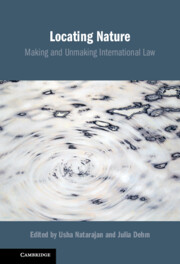Book contents
- Locating Nature
- Locating Nature
- Copyright page
- Contents
- Contributors
- Foreword
- Acknowledgements
- Introduction: Where Is the Environment?
- Part I Locating Nature in International Law
- 1 Locating Nature
- 2 From Classical Liberalism to Neoliberalism
- 3 Reconfiguring Environmental Governance in the Green Economy
- Part II Unmaking International Law
- Part III Alternatives and Remakings
- Index
3 - Reconfiguring Environmental Governance in the Green Economy
Extraction, Stewardship and Natural Capital
from Part I - Locating Nature in International Law
Published online by Cambridge University Press: 22 September 2022
- Locating Nature
- Locating Nature
- Copyright page
- Contents
- Contributors
- Foreword
- Acknowledgements
- Introduction: Where Is the Environment?
- Part I Locating Nature in International Law
- 1 Locating Nature
- 2 From Classical Liberalism to Neoliberalism
- 3 Reconfiguring Environmental Governance in the Green Economy
- Part II Unmaking International Law
- Part III Alternatives and Remakings
- Index
Summary
This chapter interrogates trends in how the natural world is taken up, governed and constituted by international law, in particular the growing marketisation of environmental governance. This chapter suggests it is fruitful to understand these contemporary forms of governance as constituted by the co-articulation of two older anthropocentric modalities of exercising power over nature: appropriative domination and stewardship. It provides a background to both these modalities, showing that though these are often understood as opposites, on a deeper level they are similar. It suggests that the ‘offset’ relation is the paradigmatic example of the co-articulation of these two modalities, as the ‘offset’ establishes a relationship between activities that damage the environment at one site and activities intended to protect, repair, or improve the environment elsewhere. This chapter situates such mechanisms as one element of a broader project to make nature legible in economic terms. In closing, this chapter considers the effects of the rise of ‘green governmentality’ and maps the terrain against which struggles for different nature/human relations take place.
Keywords
- Type
- Chapter
- Information
- Locating NatureMaking and Unmaking International Law, pp. 70 - 108Publisher: Cambridge University PressPrint publication year: 2022
- 3
- Cited by



